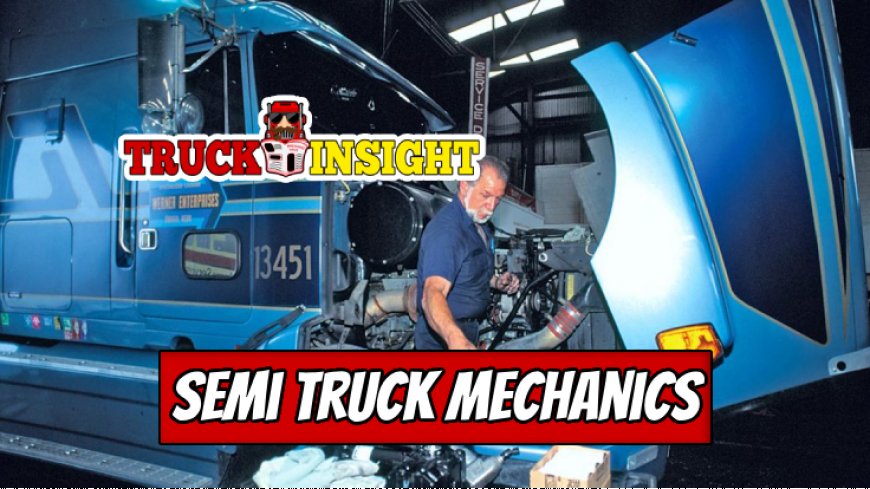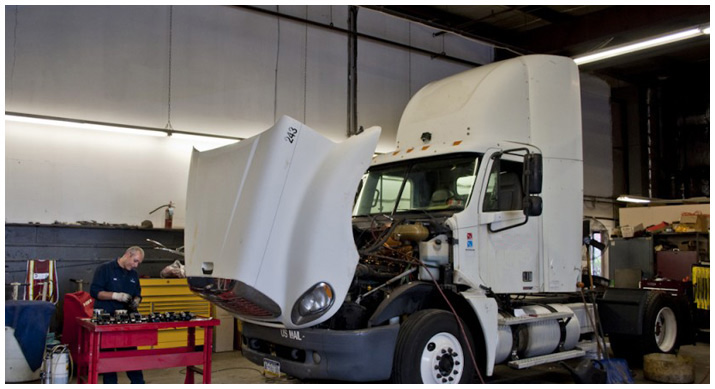Top 5 Best Practices in Semi Truck Mechanics
Explore the world of semi truck mechanics in this insightful Top 5 rundown. Gear up for success in this high-demand profession.

Discover the vital role of semi truck mechanics; these professionals establish the heart and soul of the expansive trucking industry. From routine maintenance to in-depth engine repairs, their skills ensure trucks remain road-ready, making them indispensable. This article provides a rundown of the top 5 best practices in semi truck mechanics. Prepare to dive deep into an exciting world of nuts, bolts, gears, and engines.
Semi Truck Mechanics: The Crucial Lifeline of the Trucking Industry
Given the paramount importance of the trucking sector to our global economy, semi truck mechanics form the backbone of this critical industry. Their technical know-how doesn't merely guarantee trucks stay operational; their expertise directly contributes to safer roadways and a more robust freight delivery industry.
Table of Contents
- Understanding Semi Truck Mechanics
- The Importance of Preventative Maintenance
- Continuous Learning and Latest Trends in Mechanics
- Tools, Not Toys: The Right Equipment for Semi Truck Mechanics
- Safety First: Essential Safety Practices for Semi Truck Mechanics
Understanding Semi Truck Mechanics

The craft of semi truck mechanics is deep-rooted in comprehensive knowledge and hands-on expertise. They navigate diverse parts, intricate systems and harness the prowess of advanced diagnostic tools to pinpoint issues. In essence, their working landscape brings together the best of mechanical and technological worlds. Here are few fundamental aspects that they deal with:
- Maintenance and repair of diesel engines
- Hydraulics systems
- Electronic systems
- Brake and suspension systems
- Overall health-check of the vehicle
A Balance of Strength and Precision
Functioning as a mechanic in the world of semi trucks requires a unique combination of grit and precision. Replacing heavy components calls for an element of muscular strength, whilst delicate operations, like calibrating fine equipment, demand a light touch and keen eye.
The Importance of Preventative Maintenance
"Don't fix it if it ain't broken." Although this adage rings true under certain circumstances, denying the importance of preventative maintenance in the context of semi trucks can lead to significant, costly issues down the line. Preventative maintenance acts as the first line of defense in avoiding disruptions to truck operations.
Creating a Preventive Maintenance Schedule
A mechanic's role isn't limited to merely fixing broken parts. It extends to proactively identifying potential issues before they escalate into significant problems. A robust preventive maintenance schedule is the golden ticket to such a proactive approach. This schedule generally includes:
- Engine Oil and Filter Changes: Regular changes are vital, considering the high mileage that semi trucks typically cover.
- Tire Inspections: Regularly inspecting for wear and tear, and ensuring proper tire inflation can tackle safety hazards.
- Checking Brake Systems: Essential for safe driving, routine brake inspections help prevent accidents.
- Cooling System Inspection: Monitoring the radiator, coolant level, and hoses can prevent engine damage due to overheating.
- Reviewing Electrical Systems: Checking battery life, wiring, and lights can prevent sudden electrical failures.
Regularly carrying out such checks goes a long way in curbing unforeseen hiccups in a semi truck's lifecycle.
Continuous Learning and Latest Trends in Mechanics
The world of semi truck mechanics is not stagnant – it's continually evolving. With the advent of new technologies like telematics, electrical systems, and digital dashboards, the learning curve for every mechanic is consistently steep. Here, the ability to keep up with these changes determines success in this dynamic field.
Stay Tuned to Technological Advancements
Understanding the significance of electronic components in modern semi trucks is a must. Diagnosis and troubleshooting increasingly involve software, sensors, and complex electronic systems. Self-driving trucks, alternative fuels, telematics, and fleet management software are emerging trends that are reshaping the industry. Being a proficient semi truck mechanic today means staying ahead of these trends and continuously updating one's skills.
Tools, Not Toys: The Right Equipment for Semi Truck Mechanics
The tools of the trade for semi truck mechanics are crucial for their productivity and efficiency. Whether it's wrenches for loosening stubborn bolts or software to diagnose complex electronic issues, a well-equipped toolbox is an absolute must.
Selecting the Right Diagnostic Tools
Understanding the color codes on wiring diagrams, taking accurate readings from multimeters, and using advanced scan tools to diagnose onboard computer systems are among the fundamental skills in the toolbox of successful semi truck mechanics. Selecting the right diagnostic tools saves time, reduces service time, and leads to more accurate repairs.
- Power Tools: These include impact wrenches, drills, and grinders, which are essential for speedy and efficient repair work.
- Hand Tools: Wrenches, ratchets, and sockets used specifically for truck maintenance must be robust and well-calibrated.
- Measurement Tools: Precise measurements are critical in semi truck repairs. Examples include calipers, micrometers, and torque wrenches.
- Diagnostic Tools: These encompass a spectrum from multimeters to advanced scan tools for diagnosing complex electronic issues.
The right tool set equips a mechanic to perform both simple and complex tasks efficiently and effectively.
Safety First: Essential Safety Practices for Semi Truck Mechanics

The line of semi truck mechanics is not without its hazards, be it from hot components, heavy machinery, or dangerous chemicals. Prioritizing safety is therefore non-negotiable. Adhering to safety practices is not just about avoiding injuries, it's also about ensuring a professional, safe work environment.
Creating a Safe Work Environment
Protective gear is the frontline defense for any mechanic's safety. Face shields, safety goggles, and gloves protect against flying debris, splashes from chemicals, and burns. Apart from personal protective equipment, a safe workspace with clearly marked safety zones, a well-ventilated area, and tidy workstations can prevent accidents.
"Safety doesn't happen by accident."
Beyond the Garage: Road Safety Practices
The responsibilities of semi truck mechanics extend beyond the garage. Encouraging and conducting vehicle safety checks, understanding the importance of load distributions, routinely checking tire air pressure, mirroring good organizational habits are practices that significantly contribute to road safety. Mechanics are thus a central pillar of society's road safety efforts, even if indirectly.
In conclusion, the world of semi truck mechanics is exciting and rewarding, but also challenging. Success in this field not only requires deep technical skills but also an unwavering commitment to safety and ongoing learning. So whether you're an experienced mechanic or just starting your journey, keep these best practices at the forefront of your mind for a rewarding career in semi truck mechanics.
What's Your Reaction?





























































